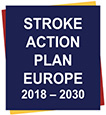The Essentials of Stroke Care
The Essentials of Stroke Care (ESC) was written as a tool for SAP-E by a working group appointed by the ESO Guideline Board. The final document was endorsed by the European Stroke Organisation.
The ESC sets an essential standard for providing stroke care in the pre-hospital setting, during the acute hospital stay, during rehabilitation and during life after stroke and includes surgical, pharmacological, non-pharmacological, and supportive interventions. This is the support and care that every stroke survivor should get. This document was written to assist advocacy and support provision of – at least – an essential standard in stroke care.
As an overview of evidence-based interventions covering the entire chain of stroke care, this document exists in a version for health care professionals and a lay version.
Methodology
The ESC lists recommendations from high-quality guidelines covering the pathway from pre-hospital care as a practical list of what to do, what not to do, and what to consider doing. We used ESO guidelines wherever available. If there were none, we preferred GRADE-based guidelines. If no GRADE-based guideline existed, we chose the best available guideline based on consensus. We referenced to the source and provided information on the type of source (e.g. evidence-based recommendation (EBR), systematic review (SR), meta-analysis (MA), randomised controlled trial (RCT), consensus statement (CS), research article (RA)) to allow the reader to judge the quality of the evidence as well as offer easy access to further reading.
The HCP version was established first and then translated into lay language.
Writing group:
• Thorsten Steiner | Department of Neurology, Klinikum Frankfurt Höchst, Frankfurt, and Heidelberg University Hospital Heidelberg, Germany
• Guillaume Turc | Department of Neurology, GHU Paris Psychiatrie et Neurosciences, Hopital Sainte-Anne, Université de Paris, Paris, France
• Jesse Dawson | Institute of Cardiovascular and Medical Sciences, College of Medical, Veterinary & Life Sciences, University of Glasgow, UK
• Katharina Sunnerhagen | Institute of Neuroscience and Physiology, University of Gothenburg, Sweden
• Hanne Christensen | Department of Neurology, Bispebjerg Hospital and University of Copenhagen, Denmark
National translations
Brazilian: HCP Version – LAY Version
Croatian: HCP Version – Lay Version
Portuguese: HCP Version
Russian: HCP Version
Ukrainian: HCP Version
Video
Prof. Thorsten Steiner discusses the importance of this document for patients and their caregivers towards the implementation of the Stroke Action Plan for Europe.


